Posted on 10/20/2021

Now that it's fall, the days are only going to get shorter. Not to mention, Daylight Savings ends next month *sigh*. With the sun setting earlier, it means you're more likely to drive in the dark. It's a proven fact that night driving is 3x more dangerous. Not only is it harder to see at night, but there are other obstacles such as bright glares from other vehicles' LED headlights. To overcome the obstacles you may face, we've put together four pointers that will help improve your visibility of the road at night: Clear Your Windshield - Dirty and damaged windshields can cause light to scatter, hide road obstacles, and potentially intensify the impacts of glares. To make you're safe and comfortable, remember to clean both the inside and outside of your windshields repeatedly. Furthermore, make sure you have functioning windshield wipers and a sufficient amount of wiper fluid. Don't Refrain from Using Your High Beams - Some people are anxious to turn o ... read more
Posted on 9/30/2021
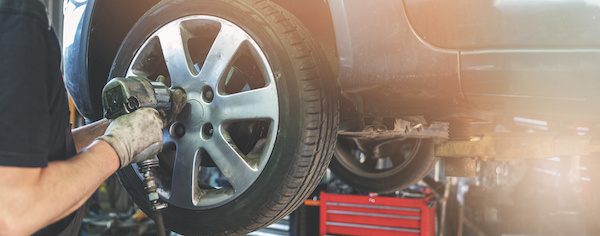
We understand that there's a lot that comes with tire maintenance, and tire rotations are just a small part of it. Getting your tires rotated will even out tire wear, which means you will achieve better handling and traction on the road. But what exactly are the "regular intervals" of tire rotations? AROUND EVERY 7,500 MILES OR 6 MONTHS. Most automobile manufacturers recommend that you get your tires rotated about every 7,500 miles or six months. However, some vehicles have exceptions, and it's always best to refer to your owner's manual for guidance. This number can vary depending on how, where, and what kind of car you drive. To make life simpler, we recommend getting into a habit of having them rotated every time you get your oil changed. What Happens During a Tire Rotation? As the name suggests, your tires get removed, swapped, and remounted. Tire rotation precisely involves the switching of your front and rear tires. It's vital to get th ... read more
Posted on 9/21/2021
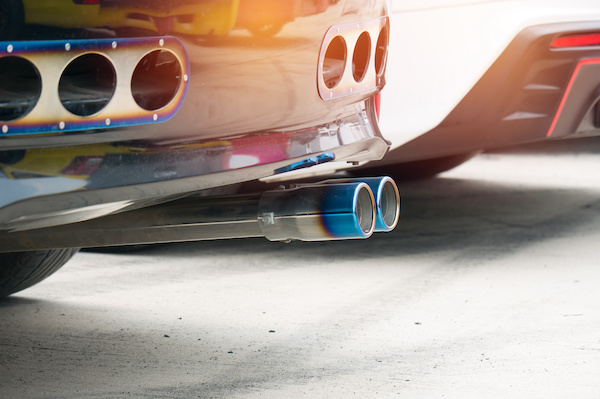
Unless you love attention, most people don't want to alert everyone with a loud roaring car. It can be embarrassing for the driver, and you could be faced with many noise complaints. Most of the time, the noisy sound that cars produce stems from an irregularity in the vehicle's exhaust system. Many exhaust systems in newer automobiles may now last well beyond 100,000 miles without any problems. But because most of the exhaust system is exposed to the conditions of the road, damage may occur without notice. These are some of the parts of the exhaust system that can be damaged and emit noise: Puncture or Crack in Muffler The most common cause of a high-pitched noise from your vehicle is any punctures in your muffler. A damaged muffler is more severe than you may think. In addition to noise pollution, your muffler may be expelling hazardous exhaust fumes. Your engine byproducts contain carbon monoxide, a gas that can make you humans very sick. If you suspect you have a ... read more
Posted on 7/16/2021
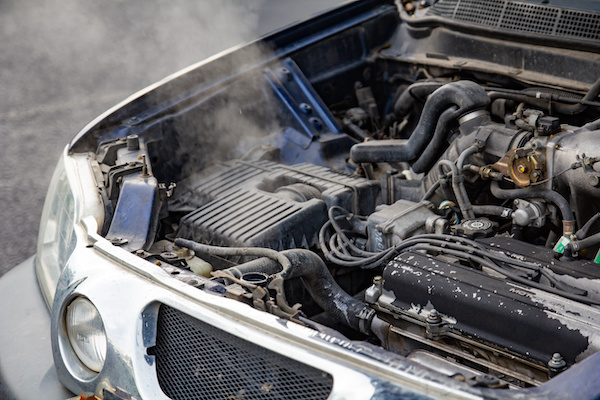
As the weather outside gets warmer, your vehicle is at a higher risk of overheating. It can be pretty alarming if and when it happens, considering one of the first signals is smoke coming from your hood. Your vehicle will need to be serviced immediately. At Monticello Auto Service, our team can get to the bottom of the problem. Here are some potential issues that cause your vehicle to overheat: Coolant System Leak A leak in the coolant system is the most common cause of an overheating engine. Your engine system comprises the radiator, water pump, head gasket, hoses, and thermostat. In some scenarios, you can patch the leak if it's less severe. However, if you are uncomfortable with the repair, we would be delighted to assist you. Low on Coolant It is essential to regularly check and refill your coolant when necessary to avoid an overheating engine. To inspect your coolant levels, make sure that your engine is turned off and your car is parked on level ground. Yo ... read more
Posted on 6/28/2021
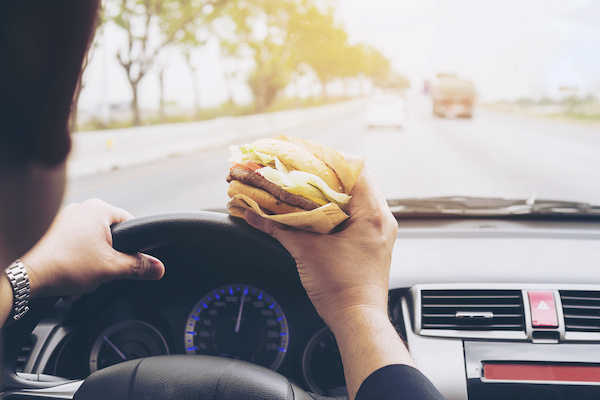
America lives on fast food and take-out for one reason: we are always on the go. We aren't here to lecture you on whether fast food is good or not. However, we do want to question whether it is safe to eat in your car while driving. You might wonder, is it even legal? Let's discuss whether or not you should pull over for that double bacon cheeseburger. Is it Safe? - 3 Types of Distracted Driving The simple answer is: No. Eating while simultaneously driving poses three kinds of distracted driving: physical, cognitive, and visual. Physical disturbances are any distraction that causes the driver to take their hands off the steering wheel. An example of this would be holding a burger in one hand while steering. Cognitive distraction is when a driver's concentration is divided between the road and something else. Visual distractions cause the driver's eyes to divert from the road. Most people struggle to eat without looking at the ... read more
Posted on 5/25/2021
.jpeg)
Vehicle maintenance is one of the easiest ways to increase the life expectancy of your engine and avoid costly repairs that result from neglect. While some issues such as flat tires and knocking engines are easy to identify, the internal systems of your vehicle can go unchecked for years if you aren't specifically looking for problems in that area. Why Fluids Need to be Changed As much as they try, car manufacturers aren't able to create a fully sealed-off system that completely filters contaminants from the air and fuel. This leads to dirt and other particulates wiggling their way into hoses and seals. Enough of this build-up and you'll start finding clogged fluid lines, blocked by debris much like a clogged artery as the fluids in a vehicle are its lifeblood. Fluids, Besides Oil, You May Need To Change Most car owners know to get their oil changed at regular intervals. You may even have a little sticker on your windshield with a date and mileage reminder to schedule y ... read more
Posted on 4/23/2021

Our vehicles are vast operations that serve us well, yet can get worn over time. Parts become frail and collect grime, tire treads hone down, and fluids drain. There are so many needed repairs that come with each season, and every unique time of the year calls for different auto repair and maintenance services. Most cars need an oil change at least once every ninety days or every 3,000 miles, but intervals can vary depending on make and model. Tire rotations are also a good choice and should be done once in the fall and in the spring. The idea is to save you money on new tires while slowing down on tread wear and tear. Other springtime maintenance typically involves an inspection of and replacement of the timing chain, along with checking the door latch of your trunk. Since your timing chain allows all the other parts of your engine to work together in harmony, getting it replaced when needed is highly essential. There are more maintenance tasks that take place in the spring, such a ... read more
Posted on 3/17/2021
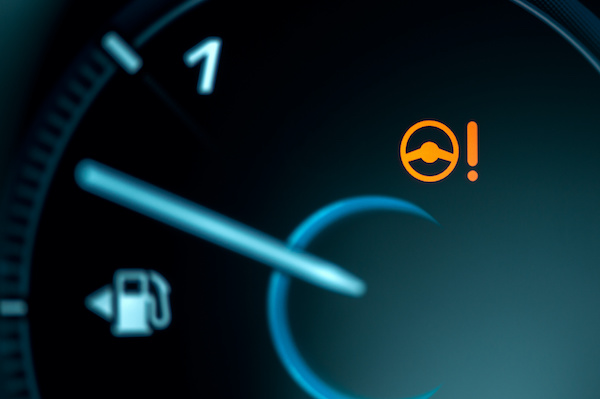
Where can I find the power steering system warning light? The power steering warning light on your car's dashboard is easily recognizable as it may be a yellow, orange or red steering wheel often accompanied by an exclamation mark. In electric power steering systems, an illuminated EPS communicates the same message. What happens when the power steering warning light comes on? Often the power steering system will fail and your car will become difficult to steer. Why does the power steering warning light come on? The light warns you that the power steering system has failed and prompts you to investigate for a cause. The cause may vary according to the type of power steering system in your car. In hydraulic power steering systems, a leak in the system causing a low fluid level is the most common cause for this problem. In electronic power steering (EPS) systems, you may find an illuminated EPS light instead. As EPS systems do not use fluid to provide steering assistance, there ... read more
Posted on 2/18/2021
.jpeg)
You might be thinking to get the vehicle batteries. A common question that might come to your mind is if all car batteries are universal! A short answer is no, but there is more to it! There are various things that you need to keep in mind when selecting the car batteries for your vehicle. Let's find out. Are Car Batteries Universal? Not really as you have noticed that different vehicles have different sizes. As car batteries are not universal, you might find yourself confused as to what car batteries would be suitable for your specific vehicle. You have to see the size, features, and a lot more! Selecting the right battery for your vehicle is important. If you are not sure, it's best to ask a professional. With advancements in the field of technology, you can see modern cars on the road that rely on electronic systems. The complicated features of such vehicles run smoothly if the batteries are working properly. You have to select the right type of battery for your car as ... read more
Posted on 1/21/2021
.jpeg)
If you're a new or aspiring truck owner and you're torn between getting a regular gasoline-powered truck or a diesel truck, then you might be wondering which one will give you more bang for your buck. We've heard (and answered) this question many, many times, and finally, want to put the matter to rest in a blog post. So, is a diesel-powered engine more efficient than a gasoline engine? To answer the question simply, yes. Diesel engines are significantly more economical than traditional gasoline engines. According to a study conducted by The Motley Fool, diesel engines are more efficient in both the city and on the highway than gasoline-powered engines (24% and 29% more efficient, respectively). However, does this increased efficiency make the larger initial investment of purchasing a diesel vehicle worth it? In case you weren't aware, diesel-powered vehicles are generally much more expensive than their gasoline-powered counterparts. That means while you'll be spe ... read more